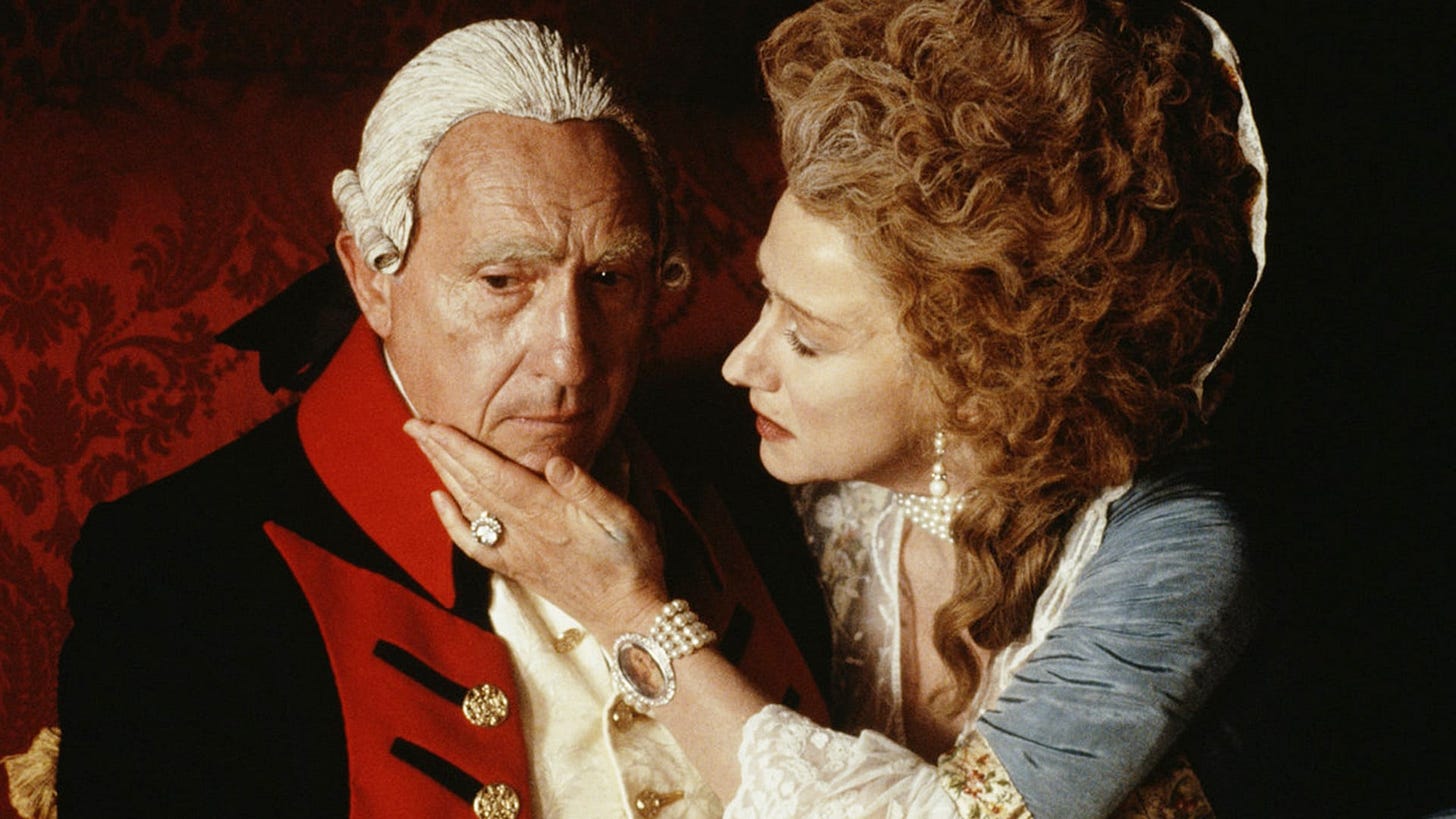The Madness of King George (1994)

Movie rating: 8/10
“If the king cannot regulate himself, how can he regulate the country?”
That question, posed by a character who is a prominent representative of the British ruling class, lies at the heart of The Madness of King George. Adapted from Alan Bennett’s play The Madness of George III and directed by Nicholas Hytner, the film dramatizes the mental illness of King George III (Nigel Hawthorne) that provoked the Regency Crisis of 1788-89.
The picture’s setting in the aftermath of the American Revolution is crucial to understanding its context. The successful war of independence in the United States was one of history’s formative bourgeois revolutions, sandwiched between the English Revolution more than a century earlier and the French Revolution that exploded weeks after the end of the Regency Crisis. The English Revolution curbed the absolutist powers of the English monarch, transforming the King into a constitutional monarch who ruled only with the consent of Parliament. Yet the continuing presence of the monarchy rankles with the likes of Whig MP Charles James Fox (Jim Carter), leader of the opposition. “God rot all royals!” Fox exclaims in the film. “Give us the wisdom of America!”
The Madness of King George works best as an evisceration of not just monarchy in all its forms, but any kind of autocratic or unaccountable rule. A man suffering from physical and mental illness (which the film identifies as porphyria, though later research has questioned that theory) to the point where he is not in control of his own faculties, who is completely erratic and irrational, nevertheless remains the head of state and cannot be removed simply because of his parentage and circumstances of birth. In response to the King’s condition, Parliament debates passing a bill that would install his son George, Prince of Wales (Rupert Everett) as Regent. But the Prince is likewise only in a position to rule because he was born into power. Prince George presents himself to the viewer as a selfish, callous fop who couldn’t care less about his parents and only seeks to aggrandize his own power.
Bennett’s screenplay makes a convincing case that monarchs, with their power and wealth, surrounded from birth by servants and sycophants, inevitably end up with a distorted view of the world. Power corrupts, and absolute power corrupts absolutely. But anyone who enjoys fawning treatment from all those around them and is never challenged will inevitably develop certain defects of character. Dr. Francis Willis (Ian Holm) makes this point directly when he takes over as the King’s physician. “To be curbed, thwarted, stood up to, exercises the character,” Willis says.
Special praise has to be given to the performances of Hawthorne, Helen Mirren as Queen Charlotte (Hawthorne and Mirren both received Oscar nominations), and Holm. Hawthorne gives us a King George who manages at different points to repel the viewer with his arrogance and poor treatment of those around him, and to elicit our pity. The scene at night when the King, moved by the Queen’s pleading, realizes his growing insanity is played well by both actors. One shot includes a full moon, long associated in the popular imagination with madness (hence the term “lunacy”). Holm puts his steely gaze—used so effectively as the android Ash in Alien—to good use as the doctor who manages to curb, thwart, and stand up to mad George, particularly in a tense scene when he tries to feed the King soup.
While much of The Madness of King George can be taken as an argument against monarchy, the film ultimately suggests that the institution itself is not the problem. Dr. Willis seems to sum up its thesis when he tells George, “Until you can govern yourself, you’re not fit to govern others.” Once King George manages to overcome his mental crisis and govern himself, so to speak, the film would have us believe that he is now fit again to govern others.
The final scene depicts the King and his family smiling and waving to adoring crowds. Based on this happy ending, the viewer might not be aware that George’s illness returned in 1804 and then permanently in 1810, lasting until his death in 1820. The problem of King George’s mental health, which was really the problem of having a hereditary monarchy, was never solved. Today, countries in the British Commonwealth including Canada continue to maintain a hereditary monarch as their head of state in the form of Queen Elizabeth II.
Regardless of the filmmakers’ intentions, The Madness of King George does not exactly make a strong case for the preservation of this institution. Quite the contrary: it underscores the need for a truly democratic form of government in which all state officials are elected, earn an average worker’s wage, and are subject to recall at any time. The best form of governance is one in which the working people who produce all of society’s wealth truly govern themselves.



